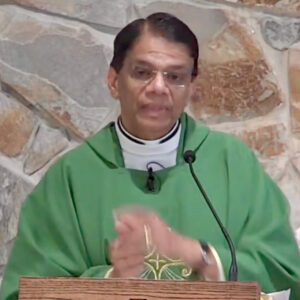There was a reason that thousands came out to hear John the Baptist’s preaching. It had been many hundreds of years since a prophet had spoken out and performed signs in the land of Israel. God had promised his people through the patriarchs of the old covenant (Abraham, Isaac, and Jacob), and through the prophets such as Isaiah, Jeremiah, Zephaniah, etc., and rulers of Israel like Moses and David, that he would send them a Redeemer who would save them from their sins, free them from oppression, fill them with the joy of his presence, and bring them his everlasting kingdom of peace and righteousness. John broke the long silence with the sudden announcement that the Messiah (God’s Anointed One) was about to appear.
The people recognized that John was an extraordinary man of God and a true prophet who spoke in God’s name. They came out to hear the “good news” which he preached to them. And they willingly submitted to his baptism of repentance at the Jordan River. The people in today’s Gospel are “filled with expectation.” They believe John the Baptist might be the messiah they’ve been waiting for. Three times we hear their question: “What then should we do?”
The messiah’s coming requires every man and woman to choose—to repent or not. That’s John’s message and it will be Jesus’, too. John’s message of renewal and repentance was very practical. He told the people three things: first, every follower of God must share what he possesses (his personal goods and resources) with his neighbors, especially with those who lacked the basic necessities of life. Second, John pointed out the sacred duty to give each and every person what is his due and not take from them what rightfully belongs to them. God commands that each person be treated with respect and that honor be given where honor is due. John told the tax collectors that they must not coerce people to pay more tax than what was rightfully owed. John instructed soldiers not to abuse their authority or power to compel people. And third, John exhorted his listeners to be content with what they had and not covet what belonged to others. John basically called the people to turn back to God and to walk in his way of love and righteousness.
Ask ourselves if we put into practice what John told them. We have the obligation to fulfill all those duties in our daily lives, too. We shall ask the Holy Spirit to fill our hearts with his fire and fulfill the commandments of love of God and neighbor in our daily lives, especially during this Advent Season.
Love and Prayers,
Fr. Charley
